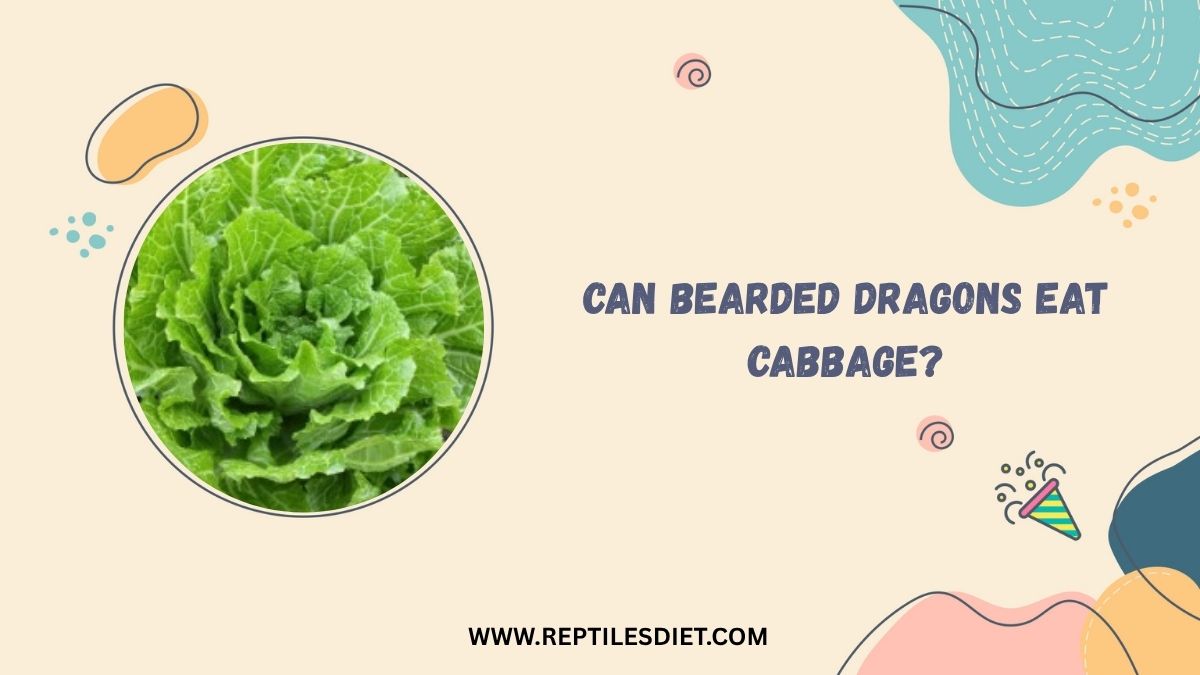Yes, bearded dragons can eat cabbage safely in small amounts. They can enjoy green, red, savoy, and napa cabbage about once a week. Too much cabbage may cause health issues, so feed it rarely and in moderation.
In this article, we’ll explore the different types of cabbage, how to prepare it, and the best feeding tips to keep your bearded dragon happy and healthy.
Cabbage Nutrition
Cabbage is a low-calorie, nutrient-rich vegetable that offers hydration and gentle fiber for your bearded dragon. It contains:
- Vitamin C – supports immune health
- Vitamin K – helps with blood clotting
- Fiber – aids digestion
- Water – keeps your dragon hydrated
- Antioxidants – protect cells from damage
- Calcium (small amounts) – essential for bone health
- Phosphorus – helps energy production but must be balanced with calcium
While cabbage has benefits, it’s not a calcium powerhouse and should be balanced with calcium-rich vegetables. It’s best served as part of a colorful, varied diet.
1. Cabbage Health Concerns
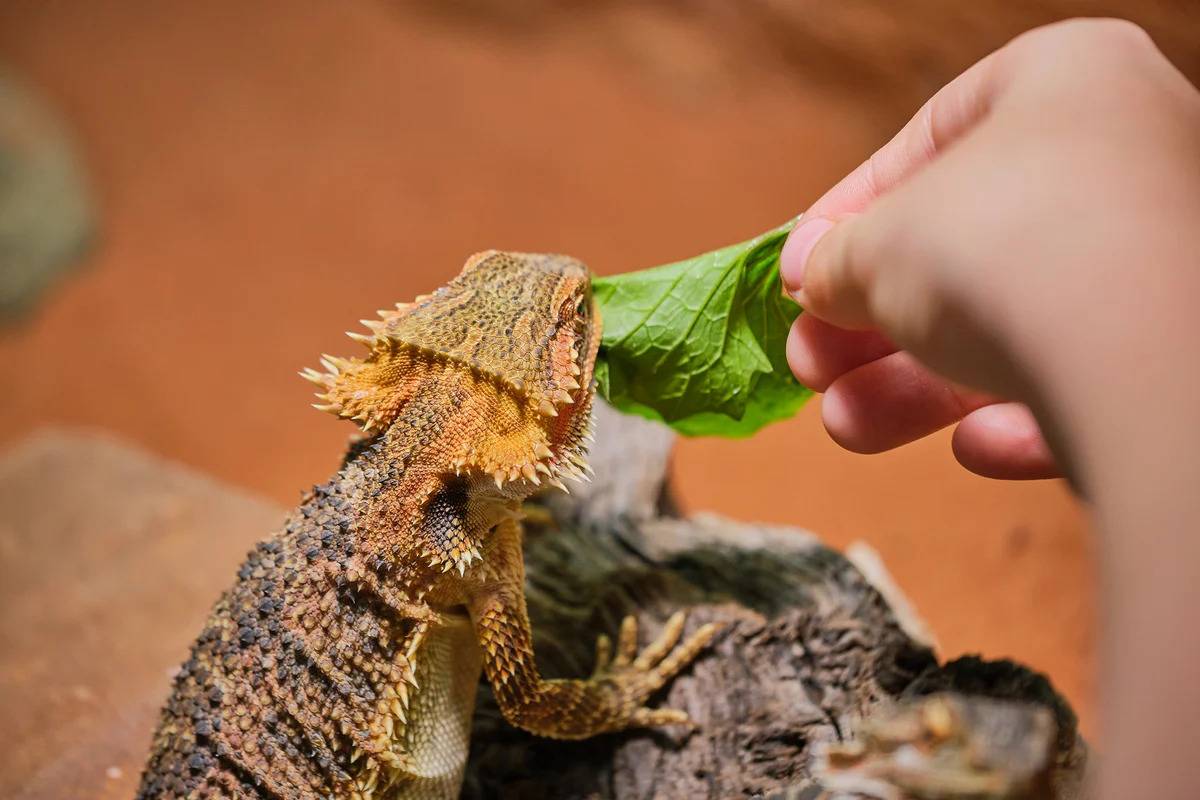
Cabbage has goitrogens, which can affect your bearded dragon’s thyroid if eaten too often. It also has a poor calcium-to-phosphorus ratio, which isn’t great for strong bones.
Eating too much cabbage might upset their tummy. So, it’s safe in small amounts but not every day. Always mix it with other healthy veggies to stay safe.
Types of Cabbage and Their Suitability
1. Green Cabbage
Green cabbage is safe in small amounts. It’s crunchy and has some vitamins but not a lot of calcium. Too much can cause tummy trouble, so give it only occasionally.
2. Red Cabbage
Red cabbage is okay as a treat. It has more color and antioxidants than green cabbage but still lacks calcium. Feed it rarely and always mix with better greens for balance.
3. Savoy Cabbage
Savoy cabbage is softer and easier to chew. It’s safe in tiny amounts, but like others, it’s not rich in calcium. Use it as part of a veggie mix, not daily.
4. Napa Cabbage
Napa cabbage is lighter and has more water. It’s fine once in a while, but not often. It won’t harm your dragon, but it shouldn’t replace healthier greens in their diet.
How to Feed Cabbage to Bearded Dragons
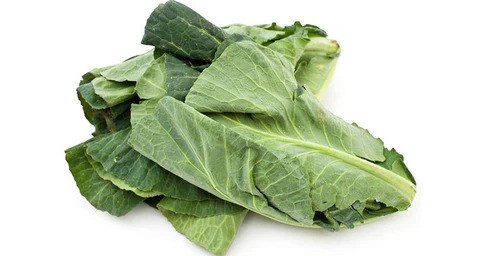
1. Cabbage Preparation
- Choose fresh, clean cabbage leaves without any spots or chemicals.
- Wash the cabbage well to remove dirt and bugs.
- Cut the cabbage into small, bite-sized pieces for easy eating.
- Always feed raw cabbage—cooking removes essential nutrients.
- Mix cabbage with other healthy veggies to keep the diet balanced.
- Offer cabbage in small amounts, not too much at once.
2. Calcium-to-Phosphorus Ratio
- The ideal ratio for bearded dragons is 2:1 (calcium to phosphorus)
- This means calcium should be twice the amount of phosphorus in their diet.
- Ratios lower than 1:1 can lead to health problems, such as metabolic bone disease.
- Keep an eye on foods with high phosphorus and balance them with calcium-rich veggies.
- Use calcium supplements if needed to maintain the right balance.
Benefits of Feeding Cabbage to Bearded Dragons
- Rich in Vitamins: Cabbage provides essential vitamins like A, C, and K to support your dragon’s health.
- High in Fiber: Helps with digestion and keeps your dragon’s gut working well.
- Low in Calories: Great for keeping your bearded dragon at a healthy weight.
- Hydrating: It contains a lot of water, which helps keep your dragon hydrated.
- Variety: Adds tasty variety to your dragon’s diet, making mealtime more exciting.
Alternatives to Cabbage
1. Other Leafy Greens
Bearded dragons love leafy greens, such as collard greens, mustard greens, and dandelion leaves. These are healthy, rich in vitamins, and beneficial for their bones. Rotate these greens to keep your dragon happy and healthy.
2. Vegetables High in Calcium
Vegetables like kale, turnip greens, and broccoli are rich in calcium. Calcium helps your bearded dragon’s bones grow strong. Feeding these veggies regularly keeps them healthy and energetic.
3. Safe Fruits for Bearded Dragons
Fruits like strawberries, blueberries, and mangoes are safe treats. They are sweet and full of vitamins but should only be given sometimes. Too much fruit can upset your dragon’s tummy.
What Does a Balanced Diet Look Like for Bearded Dragons?
A balanced diet for bearded dragons includes a mix of leafy greens, vegetables, live insects, and occasional fruits.
This combination ensures they receive essential nutrients for growth, energy, and overall health. Offering variety helps prevent nutritional deficiencies and keeps mealtime exciting for your pet.
1. Leafy Greens and Vegetables
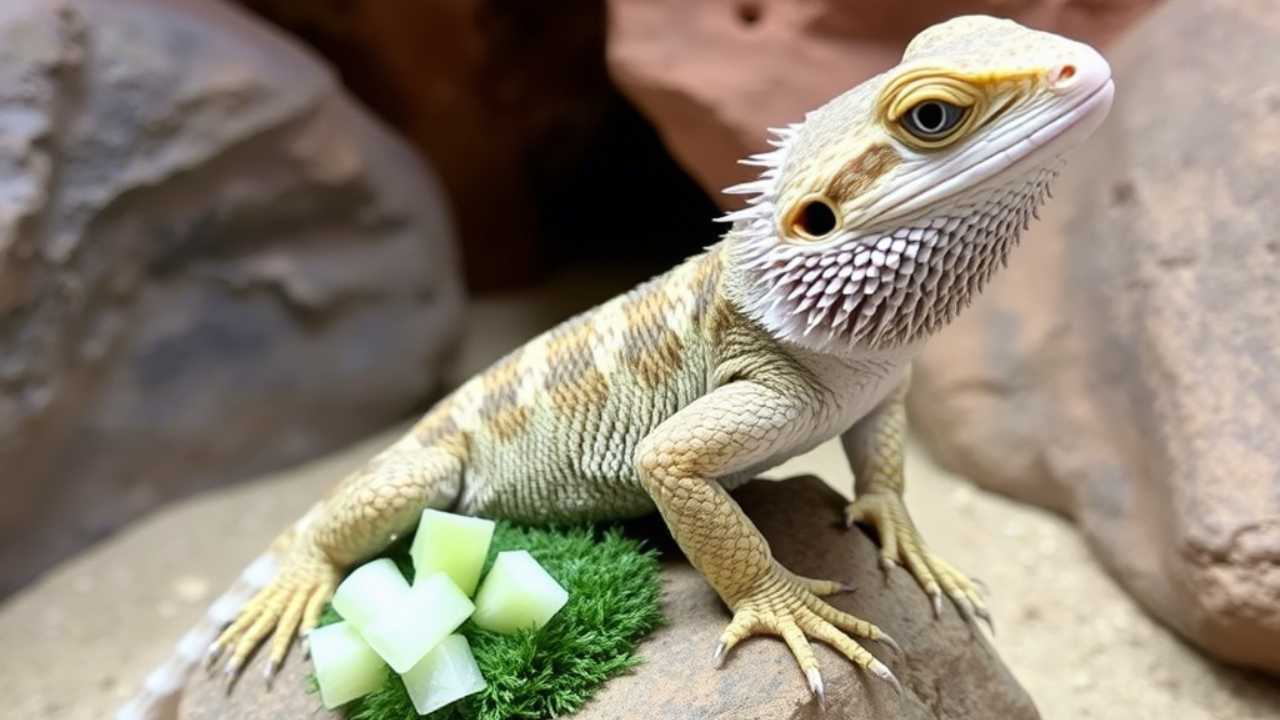
Leafy greens, such as collard greens, mustard greens, and dandelion greens, are rich in calcium and vitamins.
Vegetables such as bell peppers, squash, and carrots provide additional nutrients and fiber. These should make up about 80% of an adult bearded dragon’s diet, supporting bone health and digestion.
2. Live Insects
Live insects like crickets, dubia roaches, and superworms are excellent protein sources for bearded dragons.
They should comprise approximately 20% of an adult’s daily diet. Insects provide essential amino acids and stimulate natural hunting behaviors, contributing to your dragon’s physical and mental well-being.
3. Fruits
Fruits like strawberries, blueberries, and mangoes can be offered occasionally as treats. They provide vitamins and antioxidants but should not exceed 10-20% of the diet due to their sugar content.
Moderation is key to maintaining a balanced diet and preventing weight gain, not obesity.
Expert Tips for a Balanced Bearded Dragon Diet
- Offer a mix of insects and fresh vegetables daily for balanced nutrition.
- Include calcium-rich greens to support healthy bone growth.
- Avoid feeding too much fruit, as it can cause digestive issues.
- Dust insects with calcium powder 2-3 times a week for extra nutrients.
- Provide fresh water and clean the feeding area regularly.
- Rotate vegetables and insects to keep meals interesting and nutritious.
- Monitor your dragon’s health and adjust your diet as it grows.
- Avoid toxic foods like avocado, rhubarb, and spinach.
- Consult a reptile vet for diet advice and health checks.
Can Baby Bearded Dragons Eat Cabbage?
Baby bearded dragons can eat cabbage but only in tiny amounts. Their diet requires a lot of protein from insects and some safe vegetables. Cabbage should be a small part of their food to avoid upsetting their growing bodies.
Can Bearded Dragons Eat Red Cabbage?
Yes, bearded dragons can eat red cabbage in small amounts. It’s safe, but it contains more phosphorus than calcium, so don’t feed it too often. Use it occasionally to add color and variety to their meals.
Can Bearded Dragons Eat Green Cabbage?
Green cabbage is safe for bearded dragons but should be given sparingly. It has more phosphorus than calcium, which can affect calcium absorption if fed too much. Use it as a treat or part of a mixed veggie diet.
Can Bearded Dragons Eat Savoy Cabbage?
Savoy cabbage is okay for bearded dragons in small amounts. Like other cabbages, it has a high phosphorus level, so don’t feed it every day. It’s good for variety and occasional treats.
Can Bearded Dragons Eat Napa Cabbage?
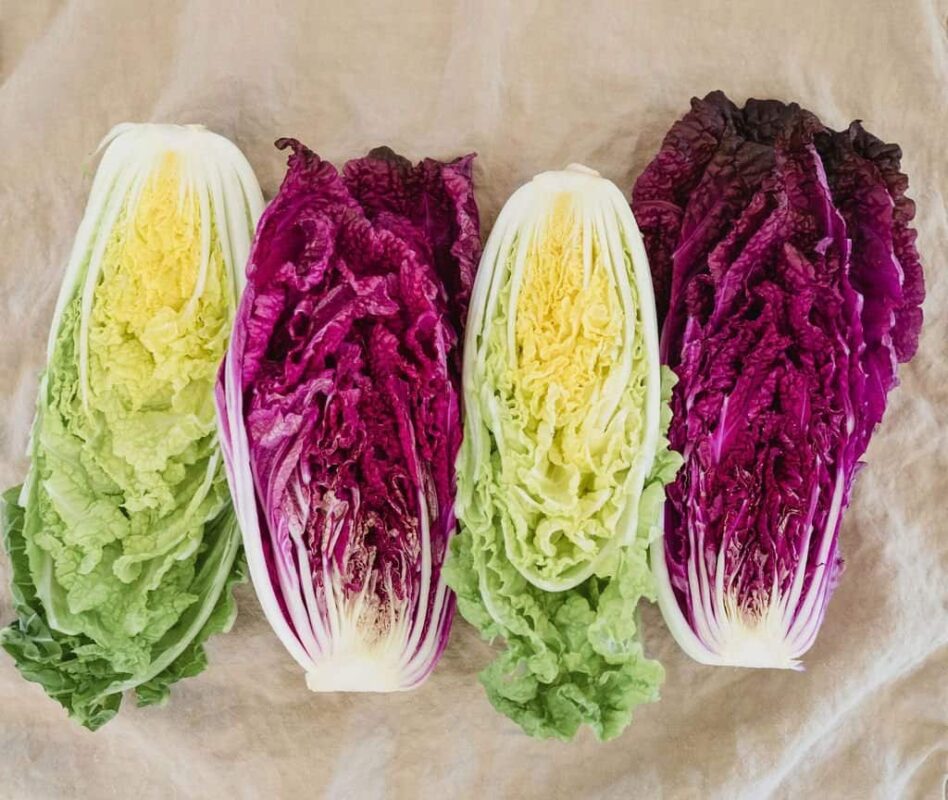
Napa cabbage is safe and softer than other types, so bearded dragons usually enjoy it. It has a better calcium-to-phosphorus ratio but should still be fed in moderation to maintain a balanced diet.
Is Cabbage a Healthy Choice for Your Bearded Dragon?
Yes, cabbage can be a healthy choice for your bearded dragon if fed in small amounts. It contains vitamins and fiber but should be given carefully because excessive intake can cause gas or digestive issues. Balance it with other greens for best health.
How Can Bearded Dragons Eat Cabbage?
Always wash cabbage well and chop it into small, bite-sized pieces. Serve fresh and raw. Avoid cooking because it can cause nutrients to be lost. Mix with other veggies to keep your beardie interested and healthy.
Can Bearded Dragons Eat Cabbage Everyday
No, cabbage should not be fed every day. It has a poor calcium-to-phosphorus ratio, which can lead to health problems if consumed excessively. Feed it only once or twice a week as part of a varied diet.
Can Bearded Dragons Eat Cabbage And Carrots
Yes, bearded dragons can eat both cabbage and carrots. Carrots add extra vitamins, while cabbage gives fiber. Feed them in small amounts and chop them well. Always mix with other safe veggies for balance.
Can Bearded Dragons Eat Cabbage Seeds
No, cabbage seeds are not safe for bearded dragons. They can be hard to digest and might cause stomach problems. Always remove seeds and feed only the soft leafy parts.
Can Bearded Dragons Eat Carrots
Yes, carrots are safe and healthy for bearded dragons. They offer vitamins and add crunch to their diet. Feed them raw and finely chopped to make eating easier for your pet.
Can Bearded Dragons Eat Purple Cabbage
Purple cabbage is similar to red cabbage and is safe in small amounts. It contains more phosphorus, so feed it occasionally rather than daily. It adds nice color and variety to your beardie’s meals.
Can Bearded Dragons Eat Lettuce
Lettuce is mostly water and has very little nutrition. It’s safe in small amounts but not as good as regular food. Iceberg lettuce, in particular, has almost no nutrients. Use it only as a treat, and focus more on leafy greens, which provide better vitamins and minerals.
Can Bearded Dragons Eat Broccoli
Broccoli is safe for bearded dragons but should be fed in moderation. It has a good mix of vitamins but also contains goitrogens, which can affect the thyroid if consumed in excess. Offer small amounts occasionally as part of a varied diet to support your pet’s overall health.
Bearded Dragon Is Crazy For Cabbage
If your bearded dragon loves cabbage, that’s great! Just remember to feed it only a little at a time because too much cabbage can cause health problems. Mix it with other veggies to keep their diet balanced and exciting.
Is Sweetheart Cabbage Safe?
Sweetheart cabbage is a type of green cabbage and is generally safe for bearded dragons. Feed it to them in small amounts and always wash it thoroughly. It can be part of a healthy mix but not a daily meal due to its high phosphorus levels.
Been Away, Beardie Has Been Fed Cabbage!
If your beardie was fed cabbage while you were away, don’t worry if it was a small amount. Just check that they are eating a balanced diet now, and also include other vegetables. Too much cabbage over time isn’t good, so keep it occasional.
Bearded Dragons Salads
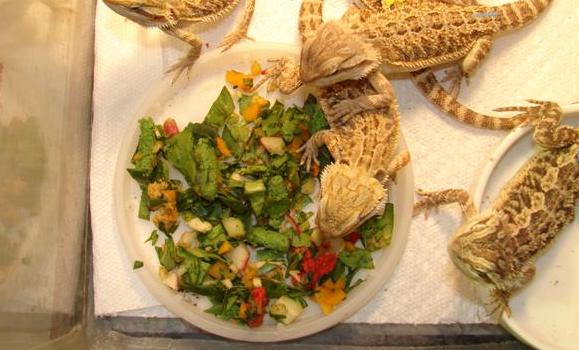
Bearded dragon salads can be a fun mix of veggies and greens like cabbage, carrots, and leafy greens. Always chop small pieces and avoid too much of one vegetable. Salads can keep a diet colorful and healthy when balanced correctly.
Cone Cabbage?
Cone cabbage, also called pointed cabbage, is safe for bearded dragons in small amounts. It’s softer and easier to digest than regular cabbage.
Still, feed it only occasionally, mixing it with other veggies to keep your dragon’s diet healthy and balanced.
Cabbage Worms From The Garden
Cabbage worms are small bugs found on cabbage plants. Avoid feeding your bearded dragon cabbage with worms or bugs from the garden because they can carry germs or pesticides. Always wash and check vegetables carefully to keep your pet safe and healthy.
What Are Some Vegetables That A Bearded Dragon Can Eat?
Bearded dragons can eat leafy greens like collard greens, mustard greens, and dandelion greens. They also enjoy veggies like squash, carrots, and bell peppers. These provide essential vitamins and minerals that help keep your dragon strong and happy.
What Are The Best Vegetables For Bearded Dragons?
The best vegetables include collard greens, mustard greens, dandelion greens, squash, and sweet potatoes. These have good calcium and nutrients.
Always offer a variety to give your dragon a balanced, healthy diet, and avoid feeding the same veggies every day.
Can Bearded Dragons Have Cabbage Regularly?
Cabbage can be given sometimes but not every day. It contains phosphorus, which can interfere with calcium absorption if consumed in excess. Offer cabbage only once or twice a week and mix it with other healthy vegetables for optimal care.
How Often Should Bearded Dragons Eat Cabbage?
Feed cabbage to your bearded dragon about once or twice a week. This helps prevent excessive phosphorus intake, which can disrupt calcium balance. Always mix cabbage with other greens and veggies to keep their diet safe and healthy.
What If My Bearded Dragon Likes Cabbage?
If your dragon loves cabbage, it’s okay to give it, but only in small amounts. Too much cabbage can cause health problems. Continue feeding your beardie other veggies, too, so it gets all the nutrients it needs for a strong body.
What Veggies Are A No No?
Avoid spinach, rhubarb, and raw beans because they have chemicals that harm bearded dragons. Also, don’t feed iceberg lettuce often—it lacks nutrition. Some veggies can upset your dragon’s health, so stick to safe, healthy options recommended by experts.
FAQs
1. Can bearded dragons eat cabbage daily?
No, cabbage should not be fed daily. Excessive consumption can lead to gas and health issues. Feed it only a few times a week.
2. What vegetables should be avoided for bearded dragons?
Avoid spinach, rhubarb, avocado, and iceberg lettuce. These veggies can be harmful to bearded dragons or cause digestive problems.
3. Can cabbage be harmful to bearded dragons in large quantities?
Yes, too much cabbage can cause gas, bloating, and digestive issues. Feed it in small amounts only.
4. Can bearded dragons eat raw cabbage?
Yes, bearded dragons can eat raw cabbage. Just chop it small and wash it well before feeding.
5. Can baby bearded dragons eat red cabbage?
Yes, babies can eat red cabbage, but only in tiny amounts. It’s best mixed with other veggies.
6. Is celery good for bearded dragons?
No, celery is not good. It has low nutrition and can be hard to digest for bearded dragons.
7. Can bearded dragons eat mint leaves?
Yes, bearded dragons can eat mint leaves, but only a little. Too much mint might upset their tummy.
8. What is a bearded dragon’s favorite meal?
Most bearded dragons love crickets and leafy greens. They enjoy a mix of live insects and fresh veggies daily.
Conclusion
Cabbage is safe for bearded dragons in small amounts, about once or twice a week. It offers vitamins and fiber but has a poor calcium-to-phosphorus ratio, so moderation is key. Always feed it raw, mixed with other healthy veggies, to ensure a balanced, nutritious diet for your dragon’s health.

